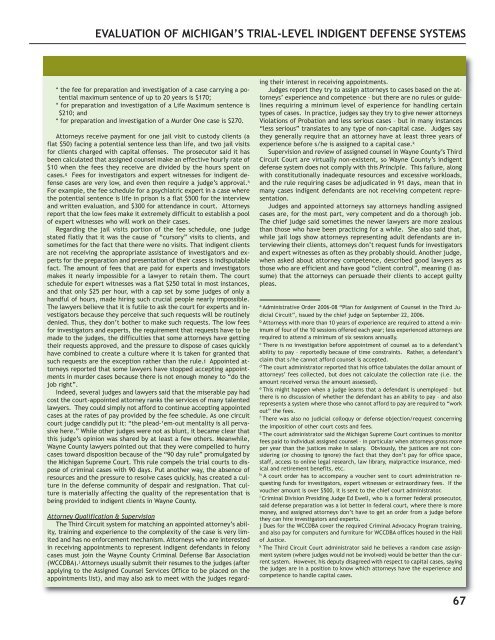Evaluation of Trial-Level Indigent Defense Systems in Michigan
Evaluation of Trial-Level Indigent Defense Systems in Michigan
Evaluation of Trial-Level Indigent Defense Systems in Michigan
You also want an ePaper? Increase the reach of your titles
YUMPU automatically turns print PDFs into web optimized ePapers that Google loves.
EVALUATION OF MICHIGAN’S TRIAL-LEVEL INDIGENT DEFENSE SYSTEMS<br />
* the fee for preparation and <strong>in</strong>vestigation <strong>of</strong> a case carry<strong>in</strong>g a potential<br />
maximum sentence <strong>of</strong> up to 20 years is $170;<br />
* for preparation and <strong>in</strong>vestigation <strong>of</strong> a Life Maximum sentence is<br />
$210; and<br />
* for preparation and <strong>in</strong>vestigation <strong>of</strong> a Murder One case is $270.<br />
Attorneys receive payment for one jail visit to custody clients (a<br />
flat $50) fac<strong>in</strong>g a potential sentence less than life, and two jail visits<br />
for clients charged with capital <strong>of</strong>fenses. The prosecutor said it has<br />
been calculated that assigned counsel make an effective hourly rate <strong>of</strong><br />
$10 when the fees they receive are divided by the hours spent on<br />
cases. g Fees for <strong>in</strong>vestigators and expert witnesses for <strong>in</strong>digent defense<br />
cases are very low, and even then require a judge’s approval. h<br />
For example, the fee schedule for a psychiatric expert <strong>in</strong> a case where<br />
the potential sentence is life <strong>in</strong> prison is a flat $500 for the <strong>in</strong>terview<br />
and written evaluation, and $300 for attendance <strong>in</strong> court. Attorneys<br />
report that the low fees make it extremely difficult to establish a pool<br />
<strong>of</strong> expert witnesses who will work on their cases.<br />
Regard<strong>in</strong>g the jail visits portion <strong>of</strong> the fee schedule, one judge<br />
stated flatly that it was the cause <strong>of</strong> “cursory” visits to clients, and<br />
sometimes for the fact that there were no visits. That <strong>in</strong>digent clients<br />
are not receiv<strong>in</strong>g the appropriate assistance <strong>of</strong> <strong>in</strong>vestigators and experts<br />
for the preparation and presentation <strong>of</strong> their cases is <strong>in</strong>disputable<br />
fact. The amount <strong>of</strong> fees that are paid for experts and <strong>in</strong>vestigators<br />
makes it nearly impossible for a lawyer to reta<strong>in</strong> them. The court<br />
schedule for expert witnesses was a flat $250 total <strong>in</strong> most <strong>in</strong>stances,<br />
and that only $25 per hour, with a cap set by some judges <strong>of</strong> only a<br />
handful <strong>of</strong> hours, made hir<strong>in</strong>g such crucial people nearly impossible.<br />
The lawyers believe that it is futile to ask the court for experts and <strong>in</strong>vestigators<br />
because they perceive that such requests will be rout<strong>in</strong>ely<br />
denied. Thus, they don’t bother to make such requests. The low fees<br />
for <strong>in</strong>vestigators and experts, the requirement that requests have to be<br />
made to the judges, the difficulties that some attorneys have gett<strong>in</strong>g<br />
their requests approved, and the pressure to dispose <strong>of</strong> cases quickly<br />
have comb<strong>in</strong>ed to create a culture where it is taken for granted that<br />
such requests are the exception rather than the rule.i Appo<strong>in</strong>ted attorneys<br />
reported that some lawyers have stopped accept<strong>in</strong>g appo<strong>in</strong>tments<br />
<strong>in</strong> murder cases because there is not enough money to “do the<br />
job right”.<br />
Indeed, several judges and lawyers said that the miserable pay had<br />
cost the court-appo<strong>in</strong>ted attorney ranks the services <strong>of</strong> many talented<br />
lawyers. They could simply not afford to cont<strong>in</strong>ue accept<strong>in</strong>g appo<strong>in</strong>ted<br />
cases at the rates <strong>of</strong> pay provided by the fee schedule. As one circuit<br />
court judge candidly put it: “the plead-‘em-out mentality is all pervasive<br />
here.” While other judges were not as blunt, it became clear that<br />
this judge’s op<strong>in</strong>ion was shared by at least a few others. Meanwhile,<br />
Wayne County lawyers po<strong>in</strong>ted out that they were compelled to hurry<br />
cases toward disposition because <strong>of</strong> the “90 day rule” promulgated by<br />
the <strong>Michigan</strong> Supreme Court. This rule compels the trial courts to dispose<br />
<strong>of</strong> crim<strong>in</strong>al cases with 90 days. Put another way, the absence <strong>of</strong><br />
resources and the pressure to resolve cases quickly, has created a culture<br />
<strong>in</strong> the defense community <strong>of</strong> despair and resignation. That culture<br />
is materially affect<strong>in</strong>g the quality <strong>of</strong> the representation that is<br />
be<strong>in</strong>g provided to <strong>in</strong>digent clients <strong>in</strong> Wayne County.<br />
Attorney Qualification & Supervision<br />
The Third Circuit system for match<strong>in</strong>g an appo<strong>in</strong>ted attorney’s ability,<br />
tra<strong>in</strong><strong>in</strong>g and experience to the complexity <strong>of</strong> the case is very limited<br />
and has no enforcement mechanism. Attorneys who are <strong>in</strong>terested<br />
<strong>in</strong> receiv<strong>in</strong>g appo<strong>in</strong>tments to represent <strong>in</strong>digent defendants <strong>in</strong> felony<br />
cases must jo<strong>in</strong> the Wayne County Crim<strong>in</strong>al <strong>Defense</strong> Bar Association<br />
(WCCDBA). j Attorneys usually submit their resumes to the judges (after<br />
apply<strong>in</strong>g to the Assigned Counsel Services Office to be placed on the<br />
appo<strong>in</strong>tments list), and may also ask to meet with the judges regard<strong>in</strong>g<br />
their <strong>in</strong>terest <strong>in</strong> receiv<strong>in</strong>g appo<strong>in</strong>tments.<br />
Judges report they try to assign attorneys to cases based on the attorneys’<br />
experience and competence – but there are no rules or guidel<strong>in</strong>es<br />
requir<strong>in</strong>g a m<strong>in</strong>imum level <strong>of</strong> experience for handl<strong>in</strong>g certa<strong>in</strong><br />
types <strong>of</strong> cases. In practice, judges say they try to give newer attorneys<br />
Violations <strong>of</strong> Probation and less serious cases – but <strong>in</strong> many <strong>in</strong>stances<br />
“less serious” translates to any type <strong>of</strong> non-capital case. Judges say<br />
they generally require that an attorney have at least three years <strong>of</strong><br />
experience before s/he is assigned to a capital case. k<br />
Supervision and review <strong>of</strong> assigned counsel <strong>in</strong> Wayne County’s Third<br />
Circuit Court are virtually non-existent, so Wayne County’s <strong>in</strong>digent<br />
defense system does not comply with this Pr<strong>in</strong>ciple. This failure, along<br />
with constitutionally <strong>in</strong>adequate resources and excessive workloads,<br />
and the rule requir<strong>in</strong>g cases be adjudicated <strong>in</strong> 91 days, mean that <strong>in</strong><br />
many cases <strong>in</strong>digent defendants are not receiv<strong>in</strong>g competent representation.<br />
Judges and appo<strong>in</strong>ted attorneys say attorneys handl<strong>in</strong>g assigned<br />
cases are, for the most part, very competent and do a thorough job.<br />
The chief judge said sometimes the newer lawyers are more zealous<br />
than those who have been practic<strong>in</strong>g for a while. She also said that,<br />
while jail logs show attorneys represent<strong>in</strong>g adult defendants are <strong>in</strong>terview<strong>in</strong>g<br />
their clients, attorneys don’t request funds for <strong>in</strong>vestigators<br />
and expert witnesses as <strong>of</strong>ten as they probably should. Another judge,<br />
when asked about attorney competence, described good lawyers as<br />
those who are efficient and have good “client control”, mean<strong>in</strong>g (I assume)<br />
that the attorneys can persuade their clients to accept guilty<br />
pleas.<br />
a Adm<strong>in</strong>istrative Order 2006-08 “Plan for Assignment <strong>of</strong> Counsel <strong>in</strong> the Third Judicial<br />
Circuit”, issued by the chief judge on September 22, 2006.<br />
b<br />
Attorneys with more than 10 years <strong>of</strong> experience are required to attend a m<strong>in</strong>imum<br />
<strong>of</strong> four <strong>of</strong> the 10 sessions <strong>of</strong>fered each year; less experienced attorneys are<br />
required to attend a m<strong>in</strong>imum <strong>of</strong> six sessions annually.<br />
c<br />
There is no <strong>in</strong>vestigation before appo<strong>in</strong>tment <strong>of</strong> counsel as to a defendant’s<br />
ability to pay – reportedly because <strong>of</strong> time constra<strong>in</strong>ts. Rather, a defendant’s<br />
claim that s/he cannot afford counsel is accepted.<br />
d<br />
The court adm<strong>in</strong>istrator reported that his <strong>of</strong>fice tabulates the dollar amount <strong>of</strong><br />
attorneys’ fees collected, but does not calculate the collection rate (i.e. the<br />
amount received versus the amount assessed).<br />
e<br />
This might happen when a judge learns that a defendant is unemployed – but<br />
there is no discussion <strong>of</strong> whether the defendant has an ability to pay – and also<br />
represents a system where those who cannot afford to pay are required to “work<br />
out” the fees.<br />
f<br />
There was also no judicial colloquy or defense objection/request concern<strong>in</strong>g<br />
the imposition <strong>of</strong> other court costs and fees.<br />
g<br />
The court adm<strong>in</strong>istrator said the <strong>Michigan</strong> Supreme Court cont<strong>in</strong>ues to monitor<br />
fees paid to <strong>in</strong>dividual assigned counsel – <strong>in</strong> particular when attorneys gross more<br />
per year than the justices make <strong>in</strong> salary. Obviously, the justices are not consider<strong>in</strong>g<br />
(or choos<strong>in</strong>g to ignore) the fact that they don’t pay for <strong>of</strong>fice space,<br />
staff, access to onl<strong>in</strong>e legal research, law library, malpractice <strong>in</strong>surance, medical<br />
and retirement benefits, etc.<br />
h<br />
A court order has to accompany a voucher sent to court adm<strong>in</strong>istration request<strong>in</strong>g<br />
funds for <strong>in</strong>vestigators, expert witnesses or extraord<strong>in</strong>ary fees. If the<br />
voucher amount is over $500, it is sent to the chief court adm<strong>in</strong>istrator.<br />
i<br />
Crim<strong>in</strong>al Division Presid<strong>in</strong>g Judge Ed Ewell, who is a former federal prosecutor,<br />
said defense preparation was a lot better <strong>in</strong> federal court, where there is more<br />
money, and assigned attorneys don’t have to get an order from a judge before<br />
they can hire <strong>in</strong>vestigators and experts.<br />
j Dues for the WCCDBA cover the required Crim<strong>in</strong>al Advocacy Program tra<strong>in</strong><strong>in</strong>g,<br />
and also pay for computers and furniture for WCCDBA <strong>of</strong>fices housed <strong>in</strong> the Hall<br />
<strong>of</strong> Justice.<br />
k<br />
The Third Circuit Court adm<strong>in</strong>istrator said he believes a random case assignment<br />
system (where judges would not be <strong>in</strong>volved) would be better than the current<br />
system. However, his deputy disagreed with respect to capital cases, say<strong>in</strong>g<br />
the judges are <strong>in</strong> a position to know which attorneys have the experience and<br />
competence to handle capital cases.<br />
67



